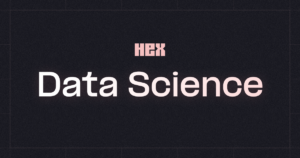
Shutterstock
Hex, an AI-driven data science and analytics startup, has secured $70 million in a Series C funding round. In a data space crowded with dashboards, notebooks, and business intelligence (BI) tools, Hex is betting the future belongs to unified and AI-native platforms.
The company plans to use the funds not only to add more AI capabilities but also to advance a more ambitious goal of replacing fragmented and outdated analytics stacks that often lead to inefficiencies and missed opportunities.
The latest funding round was led by Avra, with participation from Snowflake Ventures, Sequoia, a16z, Amplify, Box Group, and Redpoint. Hex is already helping customers like Anthropic, Reddit, HubSpot, Cisco, NBA, Figma, StubHub, and Rivia tackle data challenges and improve how technical and business teams work together.
The new funding reportedly brings Hex’s total raised to $172 million. The fresh capital helps Hex continue its push to rethink how organizations approach data and analytics. Along with major revenue milestones, Hex recently acquired Hashboard – a BI and analytics platform.
Founded in 2020 by former Palantir employees Barry McCardel, Caitlin Colgrove, and Glen Takahashi, Hex was born directly out of the frustrations they experienced working with fragmented data tools.
As McCardel puts it, “I sometimes say Hex is a very selfish company – and not just in the normal way for-profit corporations are. I say it because the whole company exists to build the data tool we always wished we had: intelligent, integrated, collaborative, and flexible.”
“We had the pain. Jumping between fragmented tools. Copy-pasting queries. Sharing a screenshot of a chart in a PDF of a deck via an email. We hated it, and were initially confused why something like Hex didn’t exist in the cloud era – and then we decided to build it.”
At the heart of Hex’s platform is a notebook-style interface that supports Python, SQL, and no-code inputs. This allows its users to analyze data and build models in one place. Its reactive execution system instantly updates all analyses whenever data or logic changes, ensuring accuracy throughout the workflow. This automatic synchronization keeps everything consistent without requiring manual adjustments.
The company also emphasizes accessibility. It enables users to package findings into interactive dashboards and share them with stakeholders through its App Builder feature. AI is deeply embedded in Hex’s platform through its Hex Magic suite, which acts like a smart AI assistant for debugging code and interpreting complex logic.
“For years, the holy grail of data analytics has been a single platform that truly serves both data scientists and business users – without compromise,” said Anu Hariharan of Avra – lead investor of the funding round. “Hex has made that vision a reality by building a tool that’s easy to get started with, but powerful enough for advanced users. By combining the flexibility of notebooks with the accessibility of BI in an AI-native platform, they’ve cracked the code. We’re proud to support Hex as they help usher in the long-awaited data decade.”
The San Francisco-based startup shared that one of the key focus areas for the company now is to redefine analytics workflows in the agentic AI era. According to Hex, it is not enough to just integrate an AI chatbot into the data stack. Hex is pushing for a “virtuous cycle of data work” where different self-serve data tools reinforce each other.
“At Hex, we’ve long believed that our work should compound – that data teams shouldn’t be stuck rerunning the same analyses, only for their insights to disappear into a forgotten notebook or buried slide,” said CEO and co-founder Barry McCardel.
“The industry is finally waking up to what we’ve known all along: the old divide between notebooks and BI is broken. AI-native, unified tools are the future, and Hex is leading the charge to replace the outdated, fragmented data stack once and for all.”
McCardel points out that as the data analytics industry went through waves of consolidation, many of the big tech players, such as Google and Salesforce, integrated analytics tools into their larger enterprise platforms. However, instead of streamlining the data workflows, many of these integrations ended up just folding legacy BI approaches into bigger ecosystems without fixing the core problems.
Now, with AI changing what is possible, the industry is another inflection point. McCardel believes that the next wave of consolidation will be less about acquisition and integration, and more about replacing outdated tools with AI-native platforms that enable organizations to harness their data to its full potential.
Related Items
2025 Data Analytics Predictions
Redbird Reveals Its Latest AI-Powered Data Analytics Tool
CDOAs Are Struggling To Measure Data, Analytics, And AI Impact: Gartner Report




